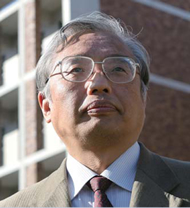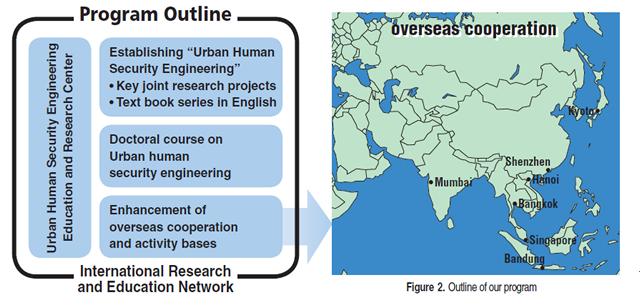Global Center of Excellence (GCOE) Programs
The Global Center for Education and Research on Human Security Engineering for Asian Megacities

Program Leader:
Prof. Yuzuru MATSUOKA
Since 2008, the Global Engineering and Architectural Engineering groups of Kyoto University Graduate School of Engineering, together with the Graduate School of Global Environmental Studies and the Disaster Prevention Research Institute, have been running a Global Center of Excellence (GCOE) Program with ‘A Global Center for Education and Research on Human Security Engineering for Asian Megacities’ as its theme. GCOE is a program run by the Japanese Ministry of Education, Culture, Sports, Science and Technology, which aims to ‘strengthen and enhance the education and research functions of graduate schools, and to establish education and research centers that perform at the apex of global excellence, so as to foster highly creative human resources who will go on to become world leaders in their respective fields. This is done by allowing them to experience and conduct research of the highest world standard.’
Basic human needs, environmental pollution, disasters and how to secure the capacity to deal with all of these in a selfreliant way, have become major questions in the megacities of Asia, and yet the reforms of the last 10 years have been a catalog of failures. One reason is of course that those cities have expanded dramatically, but more importantly, the maintenance of technology and systems for dealing with the risks involved has been carried out in a piecemeal fashion. Even where further technology and systems have been introduced, there has been a lack of interest in providing personnel or communities to manage them.
Based on a recognition of this, our program is founded on civil engineering, architectural engineering, environmental engineering, and disaster prevention studies, but with a thoroughly hands-on approach. By concentrating our efforts on promoting the complementary coevolution of engineering technology, urban administrative management, and systems creation, we are transforming the elemental body of learning accumulated up to now, into a more comprehensive body of learning which includes the formulation of policies and management strategies for cities so that they can ensure human security. That is the basis for the education and research which we are carrying out.
In concrete terms, in addition to our headquarters in Kyoto, we have developed centers in six cities in parts of Asia (Shenzhen in China, Hanoi in Vietnam, Bangkok in Thailand, Singapore, Bandung in Indonesia and Mumbai in India) which act as overseas bases. We carry out joint research with universities, research institutes and private enterprise in these countries, and train 20 doctoral students a year, among our other activities.
The diagram below gives an outline of our program. Enquiries from interested parties are warmly welcome


